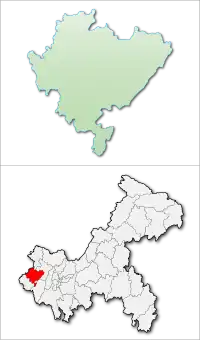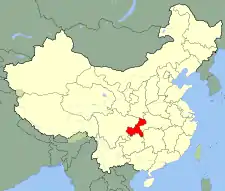Dazu
大足区 | |
|---|---|
 | |
 Dazu in Chongqing | |
| Coordinates: 29°42′N 105°43′E / 29.700°N 105.717°E | |
| Country | People's Republic of China |
| Municipality | Chongqing |
| Area | |
| • Total | 1,433 km2 (553 sq mi) |
| Population (2010) | |
| • Total | 721,300 |
| • Density | 500/km2 (1,300/sq mi) |
| Time zone | UTC+8 (China Standard) |
Dazu District (simplified Chinese: 大足区; traditional Chinese: 大足區; pinyin: Dàzú Qū) is a district of Chongqing, China, bordering Sichuan province to the northwest. It is where the famous Dazu Rock Carvings, a UNESCO World Heritage Site, is located. Dazu Lotus Manor is a tourist attraction with many lotus plants, some bred from seeds sent to space.
History
In the late 19th century, Dazu was the site of major violence led by the Gelaohui against Chinese Christians who were accused of controlling the local coal market, and resented for the large church built between two major temples devoted to Lingguan on the main market square. This church was destroyed multiple times in the 1880s and 1890s. The violence displaced thousands of people, with one incident, in 1890 leading to the deaths of 12 Christians who refused to bow to statues of Lingguan.[1][2]
In October 2011, Dazu County and Shuangqiao District were merged to form the new Dazu District.[3]
Transport
- Dazushike railway station on Chengdu-Chongqing Central line high-speed railway is currently under construction[4]
Administrative divisions
| Name | Chinese (S) | Hanyu Pinyin | Population (2010)[5] | Area (km2) |
|---|---|---|---|---|
| Longgang Subdistrict | 龙岗街道 | Lónggǎng Jiēdào | 74,605 | 43.83 |
| Tangxiang Subdistrict | 棠香街道 | Tángxiāng Jiēdào | 66,325 | 60.2 |
| Longtanzi Subdistrict | 龙滩子街道 | Lóngtānzi Jiēdào | 13,258 | |
| Longshui town | 龙水镇 | Lóngshuǐ Zhèn | 121,609 | 81 |
| Zhifeng town | 智凤镇 | Zhìfèng Zhèn | 28,467 | 67.17 |
| Baoding town | 宝顶镇 | Bǎodǐng Zhèn | 17,591 | 63.78 |
| Zhong'ao town | 中敖镇 | Zhōng'áo Zhèn | 31,118 | 113.62 |
| Sanqu town | 三驱镇 | Sānqū Zhèn | 28,563 | 76 |
| Baoxing town | 宝兴镇 | Bǎoxìng Zhèn | 18,963 | 51.49 |
| Yulong town | 玉龙镇 | Yùlóng Zhèn | 16,072 | 51.07 |
| Shima town | 石马镇 | Shímǎ Zhèn | 22,820 | 51.6 |
| Shiwan town | 拾万镇 | Shíwàn Zhèn | 16,103 | 49 |
| Huilong town | 回龙镇 | Huílóng Zhèn | 12,974 | 49 |
| Jinshan town | 金山镇 | Jīnshān Zhèn | 11,034 | 38 |
| Wangu town | 万古镇 | Wàngǔ Zhèn | 28,871 | 66.5 |
| Guoliang Town | 国梁镇 | Guóliáng Zhèn | 11,392 | 38.97 |
| Yongxi Town | 雍溪镇 | Yōngxī Zhèn | 15,213 | 39.92 |
| Zhuxi town | 珠溪镇 | Zhūxī Zhèn | 34,113 | 83 |
| Longshi town | 龙石镇 | Lóngshí Zhèn | 10,477 | 31.4 |
| Youting town | 邮亭镇 | Yóutíng Zhèn | 44,363 | 107 |
| Tieshan town | 铁山镇 | Tiěshān Zhèn | 15,669 | 59.97 |
| Gaosheng town | 高升镇 | Gāoshēng Zhèn | 13,995 | 48 |
| Jijia town | 季家镇 | Jìjiā Zhèn | 10,941 | 53.6 |
| Gulong town | 古龙镇 | Gǔlóng Zhèn | 6,442 | 18 |
| Gaoping town | 高坪镇 | Gāopíng Zhèn | 13,523 | 46 |
| Shuanglu town | 双路镇 | Shuānglù Zhèn | 26,582 | |
| Tongqiao town | 通桥镇 | Tōngqiáo Zhèn | 10,276 | 18.5 |
Climate
| Climate data for Dazu (1991–2018 normals, extremes 1981–2010) | |||||||||||||
|---|---|---|---|---|---|---|---|---|---|---|---|---|---|
| Month | Jan | Feb | Mar | Apr | May | Jun | Jul | Aug | Sep | Oct | Nov | Dec | Year |
| Record high °C (°F) | 17.8 (64.0) |
23.7 (74.7) |
32.3 (90.1) |
34.0 (93.2) |
36.7 (98.1) |
36.5 (97.7) |
38.8 (101.8) |
41.9 (107.4) |
40.6 (105.1) |
33.7 (92.7) |
26.0 (78.8) |
18.2 (64.8) |
41.9 (107.4) |
| Mean daily maximum °C (°F) | 9.5 (49.1) |
12.7 (54.9) |
17.6 (63.7) |
23.0 (73.4) |
26.5 (79.7) |
28.6 (83.5) |
32.1 (89.8) |
32.2 (90.0) |
27.1 (80.8) |
21.1 (70.0) |
16.4 (61.5) |
10.8 (51.4) |
21.5 (70.6) |
| Daily mean °C (°F) | 6.5 (43.7) |
9.0 (48.2) |
13.0 (55.4) |
17.9 (64.2) |
21.4 (70.5) |
24.0 (75.2) |
27.0 (80.6) |
26.6 (79.9) |
22.6 (72.7) |
17.5 (63.5) |
13.0 (55.4) |
8.0 (46.4) |
17.2 (63.0) |
| Mean daily minimum °C (°F) | 4.3 (39.7) |
6.4 (43.5) |
9.7 (49.5) |
14.2 (57.6) |
17.8 (64.0) |
20.8 (69.4) |
23.3 (73.9) |
22.8 (73.0) |
19.7 (67.5) |
15.3 (59.5) |
10.7 (51.3) |
6.0 (42.8) |
14.2 (57.6) |
| Record low °C (°F) | −2.9 (26.8) |
−1.2 (29.8) |
0.6 (33.1) |
5.3 (41.5) |
8.5 (47.3) |
13.6 (56.5) |
16.6 (61.9) |
17.1 (62.8) |
13.2 (55.8) |
5.4 (41.7) |
0.1 (32.2) |
−2.7 (27.1) |
−2.9 (26.8) |
| Average precipitation mm (inches) | 15.3 (0.60) |
19.4 (0.76) |
39.3 (1.55) |
78.0 (3.07) |
112.2 (4.42) |
183.1 (7.21) |
170.5 (6.71) |
154.0 (6.06) |
107.6 (4.24) |
83.6 (3.29) |
35.0 (1.38) |
17.2 (0.68) |
1,015.2 (39.97) |
| Average precipitation days (≥ 0.1 mm) | 10.6 | 9.6 | 10.7 | 13.6 | 15.1 | 16.1 | 12.6 | 12.8 | 14.1 | 17.0 | 11.1 | 10.0 | 28.2 |
| Average snowy days | 0.6 | 0.3 | 0 | 0 | 0 | 0 | 0 | 0 | 0 | 0 | 0 | 0.3 | 1.2 |
| Average relative humidity (%) | 86 | 82 | 79 | 79 | 79 | 84 | 81 | 80 | 84 | 88 | 87 | 87 | 83 |
| Mean monthly sunshine hours | 28.2 | 37.8 | 74.1 | 99.1 | 106.8 | 92.4 | 154.7 | 152.5 | 89.8 | 47.0 | 44.1 | 25.8 | 952.3 |
| Percent possible sunshine | 9 | 12 | 20 | 26 | 25 | 22 | 36 | 38 | 25 | 13 | 14 | 8 | 21 |
| Source: China Meteorological Administration[6][7] | |||||||||||||
References
- ↑ Duara, Prasenjit (1996). Rescuing history from the nation : questioning narratives of modern China (Pbk. ed.). Chicago: University of Chicago Press. p. 122. ISBN 0-226-16722-4.
- ↑ Bickers, Henriot, eds. (2017). New frontiers : imperialism's new communities in East Asia, 1842-1953 (MSI ed.). Manchester, UK. pp. 81–83. ISBN 978-1526119742.
{{cite book}}:|last1=has generic name (help)CS1 maint: location missing publisher (link) CS1 maint: multiple names: authors list (link) - ↑ 重庆调整部分行政区划:4区(县)并为2区 [Chongqing adjusts administrative divisions: 4 districts/counties merge into 2 districts] (in Simplified Chinese). 163 News. Archived from the original on 2011-10-31. Retrieved 2011-11-10.
- ↑ "走进区域看发展 以后坐高铁去看大足石刻 从这个站下走800米就到了".
- ↑ shi, Guo wu yuan ren kou pu cha ban gong; council, Guo jia tong ji ju ren kou he jiu ye tong ji si bian = Tabulation on the 2010 population census of the people's republic of China by township / compiled by Population census office under the state; population, Department of; statistics, employment statistics national bureau of (2012). Zhongguo 2010 nian ren kou pu cha fen xiang, zhen, jie dao zi liao (Di 1 ban. ed.). Beijing Shi: Zhongguo tong ji chu ban she. ISBN 978-7-5037-6660-2.
{{cite book}}: CS1 maint: numeric names: authors list (link) - ↑ 中国气象数据网 – WeatherBk Data (in Simplified Chinese). China Meteorological Administration. Retrieved 28 April 2023.
- ↑ "Experience Template" 中国气象数据网 (in Simplified Chinese). China Meteorological Administration. Retrieved 28 April 2023.

